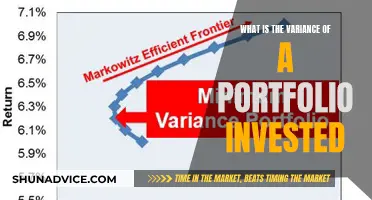
Argentina has a history of sovereign debt default, with the country having defaulted nine times between 1827 and 2020. The country's political, judicial and commercial systems have long been associated with political corruption, and its current foreign debt situation means that the risk of sovereign debt default remains high. Other political risks include exchange controls, project change caused by changes of government, and the international economic situation. Argentina's export trade is vulnerable to trade frictions, which can trigger financial turmoil. Given this, investors should pay close attention to the political and economic dynamics of the country and implement measures to respond to political risks.
| Characteristics | Values |
|---|---|
| Sovereign debt default risk | High |
| Political risk | High |
| Political corruption | High |
| Trade frictions | High |
| International economic situation | Uncertain |
What You'll Learn

Argentina's history of sovereign debt default
Argentina has a history of sovereign debt default, with nine defaults recorded between 1827 and 2020. In December 2001, Argentina stopped payment on its foreign debts of about US$130 billion, the largest such default by a sovereign state up to that time. On 22 May 2020, Argentina once again announced that it was postponing payment of interest on about US$500 million in bonds, officially entering its ninth sovereign default.
The Argentine government’s intent to pay back its debts has been hampered by high debt servicing costs, massive fiscal expenditures, and immense outstanding foreign debt, as well as the Covid-19 pandemic. The country’s sovereign debt default risk remains quite high, and major international rating agencies have downgraded the country. For example, Moody’s downgraded its credit rating from Caa2 to Ca and changed its outlook to negative.
The political risk and uncertainty involved in investing in Argentina are largely caused by economic instability. Other political risks include corruption, exchange controls, project change caused by changes of government, and the international economic situation. Argentina’s political, judicial, and commercial systems have long been associated with political corruption.
Commodities account for a relatively large slice of Argentina’s export trade, making it quite vulnerable to trade frictions and world economic uncertainty. This uncertainty may prompt international investors to reduce their investment in emerging markets, increasing Latin American governments’ and businesses’ financing costs. Chinese enterprises preparing to invest in Argentina should pay close attention to the political and economic dynamics of the country. From the perspective of risk prevention, high priority should be given to contractual arrangements, and if necessary, measures for responding to political risks should be implemented at the contractual level with the assistance of an external team of professionals.
India's Investment Opportunities: Where to Invest Now?
You may want to see also

Political corruption
Argentina's high debt servicing costs, massive fiscal expenditures, and immense outstanding foreign debt, together with the raging Covid-19 pandemic, have made it impossible for the government to pay its debts on schedule. This has resulted in the country's ninth sovereign default, which has further increased the risk of investing in Argentina.
The country's vulnerability to trade frictions and world economic uncertainty has also triggered financial turmoil in Argentina. This uncertainty may prompt international investors to reduce their investment in emerging markets, increasing financing costs for Latin American governments and businesses. Chinese enterprises, in particular, should pay close attention to the political and economic dynamics of the country before investing.
To mitigate the risks associated with investing in Argentina, it is essential to prioritise contractual arrangements and implement measures to address political risks at the contractual level, with the assistance of external professionals. Given the country's history of sovereign defaults and political corruption, investors should carefully consider the potential risks and uncertainties before committing capital to Argentina.
How Investment Demand Curve Increases: Factors and Influence
You may want to see also

Economic instability
Argentina has a history of economic instability, which has led to a high sovereign debt default risk. Between 1827 and 2020, Argentina defaulted on its debts eight times, with the most recent default occurring in 2020. The country's high debt servicing costs, massive fiscal expenditures, and outstanding foreign debt have made it difficult for the government to repay its debts on schedule.
The Argentine government's default record and current foreign debt situation have resulted in major international rating agencies downgrading the country. For example, Moody's downgraded its credit rating from Caa2 to Ca and changed its outlook to negative.
Commodities account for a large portion of Argentina's export trade, making the country vulnerable to trade frictions and world economic uncertainty. This uncertainty can trigger financial turmoil in Argentina and may prompt international investors to reduce their investment in emerging markets.
Political risks, including corruption, exchange controls, and project changes caused by changes in government, also contribute to the economic instability in Argentina. To mitigate these risks, investors should prioritise contractual arrangements and implement measures to address political risks at the contractual level, with the assistance of external professionals.
Understanding Risk-Free Investments: Beta and the Market
You may want to see also

Trade frictions
Argentina has a history of sovereign debt default, with nine defaults recorded between 1827 and 2020. In December 2001, Argentina stopped payment on its foreign debts of about US$130 billion, the largest such default by a sovereign state at the time. In May 2020, Argentina entered its ninth sovereign default, postponing payment of interest on about US$500 million in bonds.
The country's political, judicial and commercial systems have long been associated with political corruption, which is a significant risk for investors. Argentina's economic instability has also led to major international rating agencies downgrading the country. For example, Moody's downgraded its credit rating from Caa2 to Ca and changed its outlook to negative.
Chinese enterprises preparing to invest in Argentina should pay close attention to the country's political and economic dynamics. To mitigate the risks associated with investing in Argentina, high priority should be given to contractual arrangements, and measures for responding to political risks should be implemented at the contractual level with the assistance of external professionals.
Cashing Out Refi: Smart Investment or Risky Move?
You may want to see also

High debt servicing costs
Argentina has a history of sovereign debt default, with nine defaults between 1827 and 2020. In December 2001, Argentina stopped payment on its foreign debts of about US$130 billion, the largest such default by a sovereign state at the time. In May 2020, Argentina once again announced that it was postponing payment of interest on about US$500 million in bonds, officially entering its ninth sovereign default.
The Argentine government’s high debt servicing costs, massive fiscal expenditures, and immense outstanding foreign debt, together with the COVID-19 pandemic, have made it impossible for the country to pay its debts on schedule. The country's sovereign debt default risk remains quite high, and major international rating agencies have downgraded Argentina's credit rating.
The political risk and uncertainty involved in investing in Argentina are largely caused by economic instability. Other political risks include corruption, exchange controls, and project change caused by changes of government. Argentina’s political, judicial, and commercial systems have long been associated with political corruption.
To mitigate the risks of investing in Argentina, high priority should be given to contractual arrangements, and if necessary, measures for responding to political risks should be implemented at the contractual level with the assistance of an external team of professionals. Chinese enterprises preparing to invest in Argentina should pay close attention to the country's political and economic dynamics.
Global Investment Factors: What Doesn't Affect International Portfolios?
You may want to see also
Frequently asked questions
There are a number of risks associated with investing in Argentina, including political corruption, economic instability, and a history of sovereign debt default.
Between 1827 and 2020, Argentina defaulted on its foreign debts eight times. In December 2001, it stopped payment on debts of about US$130 billion, the largest such default by a sovereign state up to that time. In May 2020, Argentina entered its ninth sovereign default.
Political corruption is a major risk, as well as exchange controls and project changes caused by changes of government.
Argentina's economy is vulnerable due to its reliance on commodities for export. Trade frictions and world economic uncertainty can also trigger financial turmoil in the country.
From a risk prevention perspective, high priority should be given to contractual arrangements. Measures for responding to political risks should be implemented at the contractual level, with the assistance of an external team of professionals.







